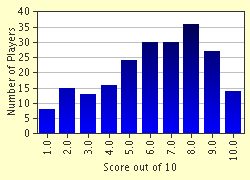Quiz Answer Key and Fun Facts
1. In what year was Great Britain created by the Union of Scotland and England?
2. On whose behalf was the 1715 Jacobite Rebellion?
3. How was Charles Edward Stuart, the Young Pretender, popularly known?
4. At which battle (the last land battle to be fought on on British soil) was the 1745 Jacobite Rebellion defeated in 1746?
5. In the 19th Century many Highland landlords began evicting their tenant farmers in order to use the land for sheep raising. This led to large areas of the Highlands becoming depopulated and also to a large proportion of the Scottish population emigrating to the USA, Canada, New Zealand and Australia. How was this process generally known?
6. Many Scots inventors have been credited with a number of important inventions. Which of the following is NOT generally held to be one of them?
7. What was removed from Scotland in 1296, stolen from its resting place in 1950, returned in 1951 and then brought back to Scotland in 1996?
8. A number of Scots have served as Prime Minister of the UK. Which of the following is NOT one of them?
9. When was the first election to the (revived) Scottish Parliament held?
10. Who was the first First Minister of Scotland?
Source: Author
alan03
This quiz was reviewed by FunTrivia editor
bloomsby before going online.
Any errors found in FunTrivia content are routinely corrected through our feedback system.

